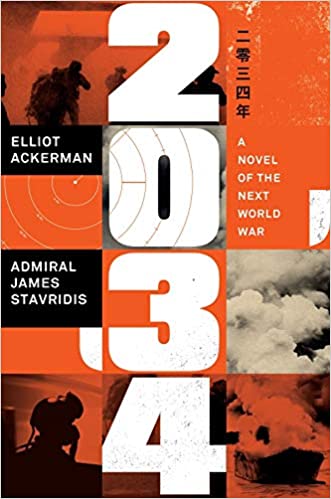Reviewed by Steve Ryan
Very senior policymakers on occasion use fiction as a way to win our attention.
For example, during the perilous 1980s, Sir John Hackett, a retired British general who fought with the British Red Devil paratroopers in the doomed Arnhem campaign in 1944, wrote The Third World War: August 1985, which was a bit clunky as a novel, but ably described the military technology of the day, and how it might be employed to successfully stop a Soviet invasion of Germany.
Retired US Navy Adm. Jim Stavridis, a former ship driver and the first naval officer to command NATO, and Commander of the joint US Southern Command and many other theater level commands, has added to the genre. Stavridis has written a number of very fine, useful, non-fiction books, including Sailing True North: Ten Admirals and Voyage of Character (2019), and Sea Power: The History and Geopolitics of the World’s Oceans (2017). He has just stepped down as Dean of the Fletcher School of Law and Diplomacy at Tufts University in Boston.
2034 benefits from having a co-author who is a genuine novelist. The resulting book presents a dark and foreboding look at a loosely-bound alliance of the People’s Republic of China (PRC), Iran, and Russia, acting in concert to take down the United States, particularly in the Pacific theater. Spoiler alert: the country which is not the initial aggressor doesn’t “win”; some potential US allies don’t fight (eg: Japan); and other nations assert themselves in the chaos, such as India.
The action focuses on a PRC cyber plot to fulfill its ambitions to displace the US as the leading world power. It begins with a deliberate PRC cyber and kinetic attack on US naval forces performing “freedom of navigation” exercises in the South China Sea. By pre-arrangement and simultaneously, a US F-35 flying near the Iranian airspace is also the victim of a PRC/Iranian executed cyber-attack. Subsequently, Russian naval and other military assets make their contribution of kinetic and cyber-attacks against the US and NATO in Europe. The overwhelming initial success of the (unexplained) technology that permits the PRC attack morphs into a cyber-Pearl Harbor, resulting in massive US naval losses, and leaves the US forced to evaluate relying on nuclear assets in order to respond to the PRC, in an attempt to dissuade the Communist Party of China (CPC) from taking Taiwan by bluster or force and end the civil war between the CPC and the Republic of China (ROC).
From the early failure of the US side, things get decidedly worse as escalation and miscalculation accelerate in multiple governments.
In the novel, the US military and political responses never catch up with events, and are consistently less than well thought out.
It raises the very pertinent question: Would it be better in real life?
The book reprises the question put forth in Graham Allison’s 2015 book, Destined for War: Can America and China Escape the Thucydides Trap, of a war resulting from the presumed “ascending power” (the PRC) over the purported “declining power” (the US).
Stavridis could have written a different book, where the PRC’s headstrong leadership starts a similar gambit which does not succeed, and which could result in a “Malvinas Moment” (referencing Argentine military leader Lt.-Gen. Leopoldo Galtieri’s desperate 1982 gambit to seize the Falkland Islands from the UK), where the internal weaknesses of the PRC’s headstrong and dictatorial leadership cadre fail in their effort to supplant the US by force.
Such an alternative version would be more comforting as it punishes aggression, and avoids sinking much of the fictional US Navy. But we must take our “table-top exercise” as the astute admiral intends. Even more uncomfortable, it may very well be 2025, not 2034, or 2039, when an emboldened (or tottering) PRC decides to make a political and military attack to complete its taking control of Taiwan as part of its gambit.
Stavridis rejects Hackett’s more comforting ending where the West wins against the Soviets. This novel is intended to be a wake-up call to be wary of drinking your own strategic and tactical bathwater.
2034: A Novel of the Next World War (Admiral James Stavridis and Elliot Ackerman, Penguin Press, New York, NY, 2021)


